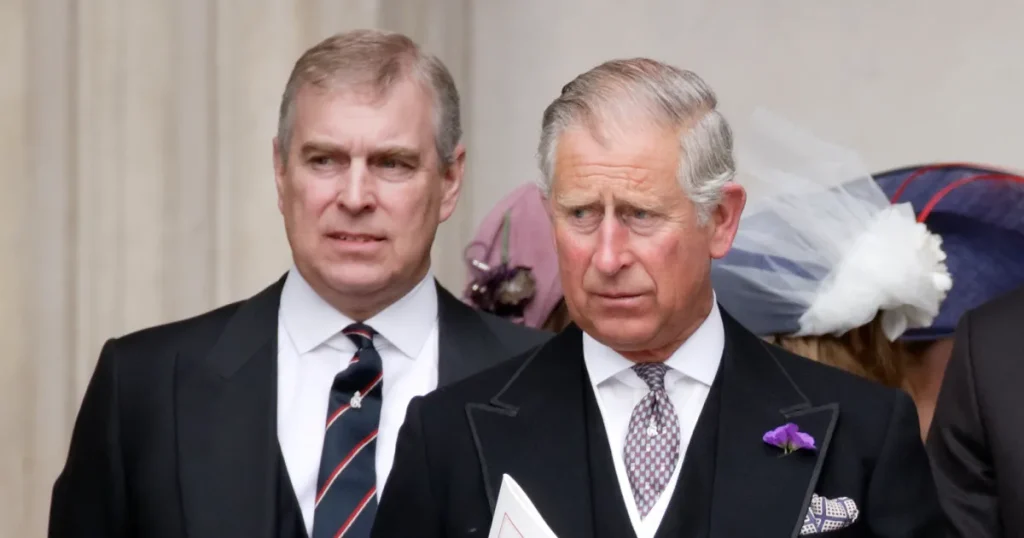The Royal Reckoning: King Charles, Prince Andrew, and the Epstein Shadow
King Charles finds himself caught in the unrelenting spotlight of media scrutiny regarding his brother Prince Andrew’s controversial association with Jeffrey Epstein, the convicted pedophile who died in 2019. The tension surrounding this relationship was starkly illustrated during a recent public appearance, when Charles faced direct questioning from a heckler while greeting wellwishers outside Lichfield Cathedral. “How long have you known about Andrew and Epstein?” the individual demanded, following with accusations about potential police cover-ups. Though the King maintained his composure, silently continuing his walkabout before being escorted away by security, the incident highlighted how the royal family cannot escape the persistent questions that follow them regarding Prince Andrew’s past. The public’s mixed reaction was evident as other onlookers admonished the heckler, revealing the complex feelings many British citizens harbor about the monarchy’s current predicament – wanting to support their King while grappling with the serious allegations that have tainted the institution’s reputation.
The situation reached a critical turning point on October 17, when Prince Andrew announced his decision to relinquish his royal titles and honors amid renewed international attention on his connection to Epstein. In a carefully worded statement, Andrew explained this decision came after discussions with the King and other family members, acknowledging that the “continued accusations” were becoming a distraction from the work of the monarchy. “I have decided, as I always have, to put my duty to my family and country first,” Andrew stated, while still maintaining his innocence regarding the allegations against him. This marks a significant escalation from his 2019 step back from public duties, representing a more complete separation from royal life. The unprecedented move underscores the severity with which the Palace now views the situation – recognizing that partial measures are no longer sufficient to distance the monarchy from the scandal that has dogged Andrew for years and threatened to undermine public confidence in the institution.
The controversy surrounding Prince Andrew centers on allegations made by Virginia Giuffre, who accused him of sexual assault in a case that eventually settled out of court in 2021. Giuffre claimed that Epstein and his associate Ghislaine Maxwell introduced her to the prince, after which the alleged abuse occurred. Throughout this ordeal, Andrew has consistently denied any wrongdoing, maintaining his innocence even as he agreed to pay an undisclosed settlement. The situation took another tragic turn with Giuffre’s suicide in April 2024 at age 41, further complicating the narrative around these serious accusations. Meanwhile, the legal consequences for others in Epstein’s circle have been definitive: Epstein died by suicide in 2019 while awaiting trial on federal sex trafficking charges, and Maxwell received a prison sentence after being convicted of child sex trafficking in 2021. These developments have kept the scandal in the public consciousness, creating an enduring shadow over the royal family that refuses to dissipate despite their efforts to move forward.
Public interest in the Andrew-Epstein relationship was reignited in 2024 when previously unseen emails between the two men emerged, directly contradicting Andrew’s earlier claims that he had severed all contact with Epstein by December 2010. These revealing messages, dating from February 2011, showed Andrew expressing solidarity with Epstein, writing, “It would seem we are in this together and will have to rise above it.” This correspondence severely undermined Andrew’s previous narrative and suggested a deeper, more enduring relationship than he had acknowledged. For many observers, these emails represented the final straw, making it impossible for the royal family to continue supporting Andrew’s position within the institution without seriously damaging their own standing. The revelation came at a particularly challenging time for the monarchy, which was already navigating health concerns for both King Charles and Catherine, Princess of Wales, creating a perfect storm of crises that demanded decisive action.
The practical consequences of Andrew’s fall from grace extend beyond titles and ceremonial roles to affect his living arrangements as well. After residing at the Royal Lodge for over two decades, Andrew and his ex-wife Sarah Ferguson now face relocation to another royal property. Reports suggest he has expressed interest in Adelaide Cottage, which was previously occupied by the Prince and Princess of Wales, indicating the complex reshuffling taking place within royal residences. “No one is really sure how it’s going to go down at the Palace yet,” a friend of the couple told The Sun, adding that “Andy is willing to leave, but these are his demands.” This housing situation reflects the broader reality of Andrew’s diminished status – no longer able to maintain the lifestyle and privileges that once came with his position, yet still negotiating for what comforts he can retain. The uncertainty surrounding these arrangements demonstrates how the practical implementation of his separation from royal life remains fluid, with many details still to be determined.
The ongoing scandal represents one of the most significant challenges to the monarchy in recent decades, testing King Charles’s leadership during the early years of his reign. Charles finds himself in the unenviable position of balancing family loyalty with institutional preservation, recognizing that protecting the monarchy may require difficult decisions regarding his own brother. The public confrontation at Lichfield Cathedral serves as a powerful reminder that, despite the Palace’s best efforts to move beyond this chapter, the questions surrounding Prince Andrew and Jeffrey Epstein will continue to follow the royal family. As they navigate this crisis, the monarchy faces a fundamental reckoning about accountability, transparency, and the balance between family protection and public responsibility. The resolution of Andrew’s status marks an important step in addressing these issues, but the deeper questions about how the institution responds to serious allegations against its members – and whether it can truly reform its approach to such matters – remain open and challenging for King Charles and the future of the British monarchy.


